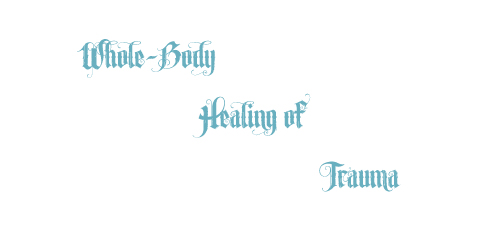Whole Body Healing of Trauma and PTSD
Part two of the book review: Waking the Tiger, Healing Trauma by Peter A Levine...
The Body as the Place of Trauma Healing
Peter A Levine introduces the idea of the 'Felt Sense', which we can learn to pay attention to and which will tell us about the sensations in the body, which can not only lead to the healing of trauma but also to more intense experiencing of everyday life.
"Consider the experience of a native tracker in the wild. In order to be tuned-in to his environment the tracker must stay completely attentive to his animal responses and felt sense. By doing so, he not only becomes more aware of his own reactions, but those of his prey. The tracker and the tracked become one. [...]
"Even though the tracker has become keenly attuned to the animal he is tracking, he must also remain aware of all other stimuli (information) in his environment, both internal and external. [...] His safety depends on remaining present by employing the felt sense. [...] Smells are rich, colors bright and vibrant. Everything is bursting with life. In this state of awareness it is possible to find beauty in what otherwise might be perceived as mundane - a twig, a caterpillar, a drop of dew on a leaf.
"While the tracker is attuned to this flow he feels a deep sense of well-being. He is ready to respond, alert yet relaxed. Optimally functioning 'orienting responses' give the tracker confidence and a sense of security about his ability to successfully identify and meet any challenge he encounters."
- Peter A Levine, p. 91, Waking the Tiger: Healing Trauma
- Peter A Levine, p. 69, Waking the Tiger
The felt sense is discussed more later in this book review, whereas this chapter concentrates on a related concept: how the key to healing trauma is in listening to the body, and not in thoughts or memories as previously believed.
"Until we understand that traumatic symptoms are physiological as well as psychological, we will be woefully inadequate in our attempts to heal them." - Peter A Levine, p. 32, Waking the Tiger
"A felt sense is not a mental experience but a physical one. Physical. A bodily awareness of a situation or person or event. An internal aura that encompasses everything you feel and know about the given subject at a given time - encompasses it an communicates it to you all at once rather than detail by detail." - Eugene Gendlin in his book 'Focusing', as quoted by Peter A Levine.

According to Peter Levine, the content of the event, the memories, and difficult psychological feelings, such as shame, fear, etc. do not matter as much when it comes to healing trauma. Instead, the focus on the symptoms of trauma, especially those felt in the body, is the way to begin to release both the emotional and physical symptoms of trauma, including the painful memories.
"One of the difficulties in treating trauma has been the undue focus on the content of an event that has engendered trauma. Trauma sufferers tend to identify themselves as survivors, rather than as animals with an instinctual power to heal. The animal's ability to rebound from threat can serve as a model for humans." - p. 98
"I learned that it was unnecessary to dredge up old memories and relive their emotional pain to heal trauma. In fact, severe emotional pain can be re-traumatizing. What we need to do to be freed from our symptoms and fears is to arouse our deep physiological resources and consciously utilize them. If we remain ignorant of our power to change the course of our instinctual responses in a proactive rather than reactive way, we will continue being imprisoned and in pain." - Peter A Levine, p. 31, Waking the Tiger
"In learning to define trauma by its symptoms, rather than by the event that caused it, we can develop perspectives that will help us recognize trauma when it occurs." - p. 152
Peter Levine explains that when it comes to trauma, it helps to be more in touch with our physical, animal-like instincts or sensations - to live more in touch with our natural feelings - instead of having learned, cultural ways of behaviour:
"Because we are human, we are vulnerable to traumatization in a way that animals are not. They key to the exit from this seemingly unsolvable predicament lies in the characteristic that most clearly distinguishes us from animals - our ability to be consciously aware of our inner experience. When we are able [...] to slow down and experience all the elements of sensation and feeling that accompany our traumatic patterns, allowing them to complete themselves before we move on, we begin to access and transform the drives and motivations that otherwise compel us to re-enact traumatic events. Conscious awareness accessed through the felt sense provides us with a gentle energetic discharge just as effective as that which the animal accesses through action. This is renegotiation." - Peter A Levine, p. 187, Waking the Tiger
The 'Felt' Sense of the Body
The felt sense is a sense we all have, which we usually already feel to some extent but can learn to feel more. It consists of the body's feelings and could, in my personal experience, also be called movement of energies. To begin working with the felt sense all we really need to do is to learn to pay more attention to our bodies and how they feel. The very subtle feelings are as important as the more obvious ones. It seems from what Peter Levine teaches, that there is much more to our body sensations than we are used to thinking.
Continue reading...
Related Articles
Trauma Release Exercises
Anxiety Diet Conclusions
How to Control Anger
Female Hormone Imbalance Diet
Brain Allergies
Food Intolerance
Quitting Caffeine
We Recommend
Latest Articles
Most Popular Articles
Collection of Best Raw Food Articles
Juice Fasting Articles
Book Summaries
Natural Remedy Library A-Z

Edition 3.0: Cheap Revolutionary Health Ebook: 68 Natural Tricks and Methods - The Amazing Power of Small Everyday Tasks
To be safe, please consult your health-care provider before attempting self-treatment for health issues.
Navigation
Home Latest Articles Conditions A-Z Raw Food Juice Fasting Recipes My Health Journey Best ArticlesConnect
Contact Us Instagram: "Good Life Meals"Trauma-Related Books






About CHR:

Ulla is the Editor of Cheap Health Revolution, covering natural remedies and health solutions. Read more about Ulla and this website here: "About CHR"









